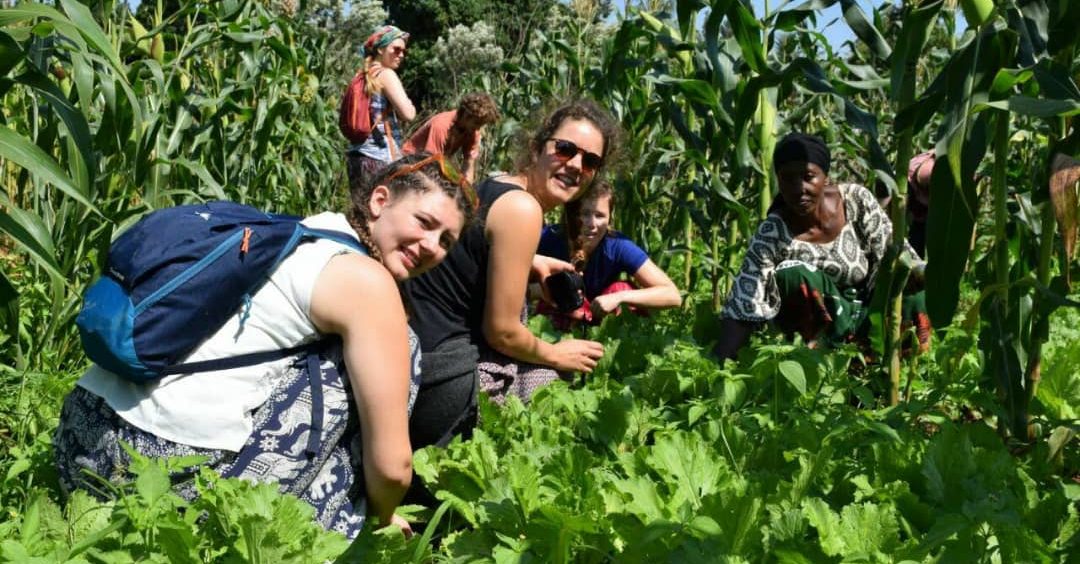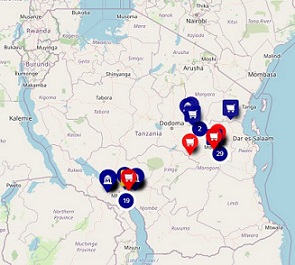Travelers under rural tourism programme of MVIWATA have an opportunity to visit rural based smallholder farmers (host families) in their villages and share, exchange and experience rural day-to-day life. This is made possible through well developed tour itineraries that puts almost 75 percent of a traveler’s time in rural areas and the 25 percent is structured for national parks, museums and town tours. Travelers have an opportunity to experience local food, accommodation, cultural and traditional practices, view the local environment, landscape and visit rural family farming projects.
In this way, tourists offer an alternative source of income to farming for rural communities while exchanging progressive ideas and knowledge. The Rural Tourism Programme is run in partnership between Mtandao wa Vikundi vya Wakulima Tanzania (MVIWATA) and TAMADI, a non-profit organisation that organizes solidarity travel programmes. The programme began in 2014 and is currently inactive because of the global pandemic. It is soon expected to resume its operations.
The Rural Tourism Programme is a fairly an emerging new concept in the tourism industry in many parts of the world including Tanzania. The most known concept of tourism is classical tourism where tourists, mostly outbound tourists visits national parks and museums as their primary tourism products. In classical tourism, local communities are mostly viewed as tour products.
Most of the large investments in classical tourism be it accommodation facilities and tour companies and operators are owned and managed by foreign investors, mostly where tourists come from. This means foreign investors are the main recipient of the money generated through classical tourism.
The rural tourism programme at MVIWATA was adopted because of its progressiveness and its center of attention on the rural smallholder farmers as opposed to classical tourism. The programme also helps in improving family farmers’ livelihoods; strengthen farmer groups and networks through the exchange of cultural and traditional experiences between farmers and travelers from different backgrounds but share common values notably on collective actions, fair trade and agro-ecology.
MVIWATA is collaborating with TAMADI a French based solidarity tourism organization to strengthen the linkage between family farmers’ groups and solidarity travelers. The program is effected in 16 villages from 7 regions of Manyara, Kilimanjaro, Arusha, Tanga, Morogoro, Dodoma and Zanzibar.
The Rural Tourism Programme was established in these areas because of the availability of active family farmer groups and network members of MVIWATA, the richness of their cultural practices, and the well-conserved environment and landscape. MVIWATA being aware of the negative impacts of classical tourism realized that it is important for family farmers to have an alternative tourism activity that will also act as a source of income to family farmers while it conserves the environment and culture of the natives.
Therefore, the concept was initiated to enable the grassroots family farmers’ groups and network to conserve and appreciate their heritage.
A tourism activity that puts family farmers groups and networks at the center of its operations?
Prior to the establishment of the programme, smallholder family farmers and members of MVIWATA have for long developed knowledge sharing platforms among themselves through periodic groups and networks meeting, and exchange visits among farmers’ groups and networks. MVIWATA members’ through grassroots farmers’ groups and networks have practiced collective actions on marketing, knowledge sharing on agro-ecological farming systems and fair trade.
The establishment of rural tourism programme at MVIWATA came to strengthen these efforts by capitalizing on the already established farmers’ groups and networks. Travelers were thought to be part of this network, and network members could share their experience with travelers notably on matters of traditional farming practices, traditional food and beverages, handicrafts, environmental conservation, and traditional dances and practices.
Solidarity travelers also shares their experiences on strengthening rural unions, sustaining local inheritance, strengthening the management of farmers’ production and processing cooperatives by buying farmers products, and supporting the struggle for access to land and livelihood resources. The programme also draws inspiration from the idea that travelling can provide learning opportunities and insights into one’s own self.
The objective of this programme is the mutual enrichment of both the travelers, who are not only observers, and the hosts, who are not only service providers, but also both, are important players in creating and sharing their experiences. The TAMADI-MVIWATA rural tourism programme is about getting to know the other through sharing daily life, meeting families, discovering villages and keeping in mind the necessity of respecting the environment, as well as the way of life and values held by others.
Accommodation and meals are shared modestly, with priority given to local food and produce consumption, and local transport (bus, train, taxi, and cart) provides a good opportunity for travelers to see the landscape and meet people at the grassroots. Through these visits, both travelers and hosts are confronted by their pre-conceptions.
Programme activities are managed transparently, and there is an agreement that precisely defines the responsibilities and revenues of each party. Financial transparency between hosts’ members of the grassroots network is a compulsory principle. Guides, interpreters, host families, local organizations and national coordinators are paid fairly for their services. At the same time, host families and local farmers’ organizations have to consider community-based tourism as a secondary revenue generating activity.
Profits obtained through rural tours are re-invested to strengthen the rural development programme activities of those involved.
The rural tourism programme, what are the grassroots farmers’ experiences?
Mlidhani Hatuwezi is a farmers’ group in Pongwe, Zanzibar, and is found in one of the 16 villages involved in the Rural Tourism Programme. The group has 35 members who are engaged in algae farming, goat and poultry keeping. Processing on soap production using materials from algae farms is also part of the group’s business
The Mlidhani Hatuwezi farmers group offers food, accommodation and agricultural, handicraft and cultural demonstrations to visitors. The tourists pay a considerably amount to the group members. The income obtained is divided among group members and some is kept to support their agricultural activities using the group’s bank account. Because of these income generation initiatives, group membership has increased from 20 to 35. Also many other farmers’ groups have been initiated at Pongwe village.
The group has been able to increase their number of goats from 5 to 33, and their chickens from 10 to 70; the number of algae farms has also increased from 2 to 17. The group is now in a project to construct a building that will be used as both a group’s office and an algae farm store. Indirect benefits have been to health and sanitation through the construction of toilets and hygiene trainings, as Bi Asha, the Mlidhani Hatuwezi chairperson from Pongwe, explains: “As a smallholder farmer I feel proud being visited by out-bound travelers in my village. We demonstrate our day-to-day activities on aspects of farming, traditional foods and beverages, handicrafts and culture.
As a farmer, I never dreamed of interacting with out-bound travelers, let alone sharing our local foods with them. It is a great privilege because we are used to see them staying in luxury hotels here in Zanzibar, but this project has enriched and made us proud of our culture and values. Our translators help us overcome language problems so we can communicate with tourists.”
The rural tourism initiative has proved to be a sustainable means of livelihood improvement in the villages involved in the programme.
What are some of the other notable impacts of the programme?
Since its establishment in 2014, host families have received an income of over 100 million TZS ($43,478) for serving food, providing accommodation and demonstrating local activities and traditions to travelers. At the same time, farmer network groups received over 30 million TZS ($13,000).
These funds have helped improve the livelihoods of the host families involved as maintenance and replacements of latrines, beds, mattresses, and mosquito nets have been bought and constructed in their houses. Cultural traditions and heritages have been enhanced and celebrated more frequently, and trees have been planted in the villages to improve the environment and protect water catchment areas.
Local farmers, authorities and villagers have internalized practices enhanced to them by MVIWATA through its rural tourism programme on aspects of environmental conservation and cultural heritage protection and development as local tour products. This includes improving accessibility to tourism destinations, and packaging and presentation of handicrafts.
During the course of the Rural Tourism Programme, some issues have arisen that have had both positive and negative effects on project stakeholders. Positive aspects include the creation of new jobs to interpreters. However, the many positive results of the Rural Tourism Programme suggest that there is a need for further collaboration, trainings and implementation with different stakeholders. The programme has also clearly lead to an increase in the number of MVIWATA friends internationally.
Nevertheless, the programme’s many positive impacts, it has also faced manageable challenges. These include the image and concept of the rural tourism is not sufficiently understood by some farmers groups and host family members, who are not directly involved in the programme, and this has lead to complications and misunderstandings because some think the project generates massive benefits to fellow family farners in the village.
In addition, other challenges are possibility of bias in selecting and identifying household host families, language barriers as travelers sometimes may wish to interact directly with villagers during a free time, knowledge gaps of guides and translators. Regular trainings with village leaders and families are therefore necessary and inevitable.







